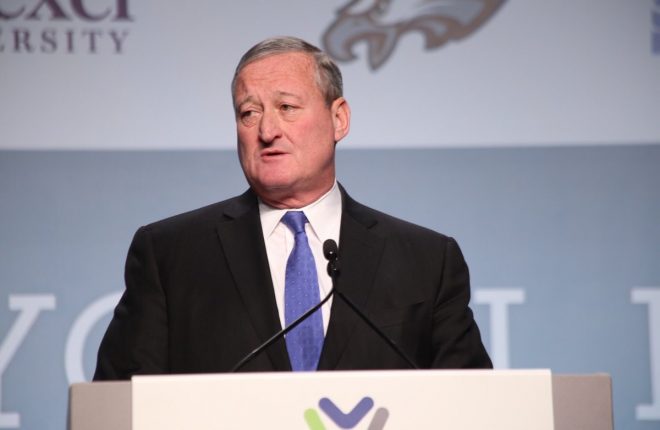Recently, I spoke to the Philadelphia Chamber of Commerce, delivering my second annual address.
I laid out a very ambitious goal for our city, which is in a unique position.
Our crime rate is at a 40 year low, our millennial and immigrant populations continue to grow, and we are at the top of the list for travel destinations and restaurant hot spots.
But we are also at the top of another list: Philadelphia has the highest poverty rate of the ten largest cities in America.
We’ve made progress — especially because of the Philadelphia Beverage Tax. The tax will create a stronger economy for all our neighborhoods by investing in pre-K, community schools, and rebuilding our parks, rec centers, and libraries.
But there is still much more work to do. Let’s get to work — together.
Infrastructure
We will launch a formal transportation and planning effort. The planning process will seek input from business, transportation and community partners on how we can equitably improve the way we move goods, services and people around the City. Critical to this plan’s success will be sustained, and even increased, investment in SEPTA from the state.
Out-of-School Plan
Later this month, we will announce a comprehensive Out-of-School Time strategy, that will build on our community school efforts and ensure we are integrating early literacy into all of our city’s summer and afterschool programming.
Pipeline Registry
The Office of Economic Opportunity (OEO) is creating a Pipeline Registry, to help emerging, women and minority owned small businesses receive smaller City contracts, even if they do not have official WMBE certification, which requires a great deal of time and internal capacity to achieve.
Global Business Hours
The Commerce Department just launched Global Business Hours in partnership with Score Philadelphia. This free bilingual business consulting service is meant to encourage small business owners with limited English to take advantage of City services.
L&I
One of the first changes we made as an administration was to launch a multi-year initiative to improve customer service at L&I. We are increasing the building inspector corps by about 30%, which will allow the department to be more responsive and increase public safety.
L&I is also opening two new districts for field inspectors near Temple University and the Point Breeze area, where new development is most concentrated.
Thanks to these and other changes, permit applications now take half as many days to process through L&I’s accelerated review program – even with the development boom driving increasingly high demand.
L&I is also embracing opportunities to innovate. This year it released several open data sets which tech-savvy volunteers used to create new online tools, including one app that encourages developers to invest in currently vacant properties.
The City’s Pension Fund
We have created a plan that will move our pension fund from less than 50% funded to 80% funded in thirteen years. This plan includes increased contributions by employees, moving to a combination defined benefit/401k for new City workers, dedicating additional revenue from the sales tax, and improving investment returns while lowering our costs.
Tax Policy
To guide our tax policy moving forward, the Department of Commerce established a Tax Policy Committee. Their current focus is on several tax credits that could be converted to grants in order ease the implementation process on the City’s end and better serve businesses.
The Philadelphia Re-Entry Program Tax Credit is currently being explored as a test of the new policy. The goal is to have at least five employers who would commit to creating 100 jobs, to be filled by returning citizens.
Attracting Talent
To capitalize on this success and further attract young talent, the Commerce Department is establishing a new incentive program that will reimburse large-scale suburban companies up to $30,000 for setting up a temporary space with 25+ employees in the city.
As we continue to move forward, I will do everything in my power to protect the values Philadelphians believe in.
We won’t turn our back on the immigrant business owners who drive our small business growth, nor the Longshoreman or the Teamster who relies on healthy trade. And we’ll continue looking for ways to connect our residents in every neighborhood, from every background to family-sustaining jobs.
Together, I know we can create a Philadelphia that works for everyone.

